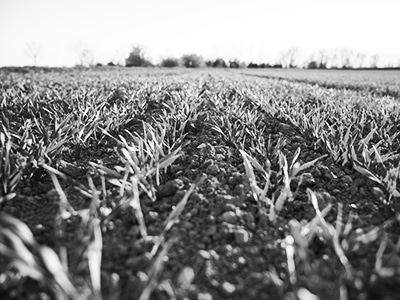The How & Why
While a vegan world may seem far off, a world that embraces a diet rich in a diverse array of plants and reduced meat consumption can help save our planet. Everyone making small changes can have a big impact.

Lower greenhouse gas emissions
Decreasing our reliance on animal agriculture provides an important path to help lower greenhouse gas (GHG) emissions. According to reports, today, animal agriculture is a top contributor to GHG emissions; a recent WorldWatch report found that at least 50% of GHG emissions are a result of animal agriculture. While a vegan world may seem far off, a world that embraces a diet rich in a diverse array of sustainably sourced plants and reduced meat consumption can help support a healthier world for all [1].

Use land more efficiently
With a finite amount of land, it is critical that we use it wisely and efficiently. Animal agriculture is typically a two-step system for feeding humans: (1) Plants - which is food for the (2) Animals - cows, chickens, etc. Today, livestock systems occupy more than half of the earth’s habitable land and greater than 40% of the earth’s surface area [2]. More than 75% of this land is used for animal feed. Directly put, we have dedicated a huge portion of our land towards growing food to feed our food. Given this, it is not surprising that some studies find that animal agriculture is the leading cause of deforestation [3]. Plant-based eating is a one-step system that allows for much more efficient use of precious and finite natural resources; water and land.

Soil health is a vital part of the ecosystem and under certain conditions, soil can sequester even more carbon than trees. Creating an environment with healthy soil is important for our future. That’s why we believe in the importance of organic farming. Studies show that organic farming produces more nutrient-dense soil and is associated with greater carbon sequestration (i.e. capturing and storing carbon dioxide from the atmosphere).
FAQs
Check out BBC’s Food Impact Calculator for more information. Interested in incorporating more plants in your diet? We also recommend these 10 tips for eating more plants.
There are many sources of plant-based protein, such as beans, grains, legumes and more. Furthermore, many plant-based sources of protein offer additional benefits such as fiber and nutrients not found in animal based protein. For high-protein vegan options, check out Climate Healers list of vegan protein sources that contain more protein per serving than beef. For more information on high quality sources of plant-based protein, you can also check out our blog here.
Like any diet, eating a vegan diet does not have to be expensive if you do some research and buy in season produce. For tips on eating a delicious vegan diet on a budget, check out our blog here. This guide to preparing easy vegan meals may also be helpful if you are new to vegetarian and vegan cooking.
There are many great resources for how animal agriculture impacts climate change. Below are a few articles and books we found informative that you might enjoy.
Resources & Articles
- U.S. Climate Resilience Toolkit – Building Food Resilience
- Climate Healer’s has many helpful guides, such as: the Science of Protein, Personal Health, and a Post-pandemic Vegan World
- “If everyone were vegan, only a quarter of current farmland would be needed” by the Economist
- ”Rapid global phaseout of animal agriculture has the potential to stabilize greenhouse gas levels for 30 years and offset 68 percent of CO2 emissions this century” by Michael Eisen and Pat Brown
- “A Vegan World Would Require 75% Less Farmland Than Present” by Vegconomist
- “Assessing the Efficiency of Changes in Land Use for Mitigating Climate Change” by Timothy Searchinger et. al.
- Vegan World 2026
Books
- Food Is Climate by Glen Merzer
- The Climate Diet by Paul Greenberg
- Our Changing Diet by Michael P. Hoffmann, Carrie Koplinka-Loehr, Danielle L. Eiseman & Lindsey Potoff
- Diet for a Small Planet by Frances Moore Lappe
As always, we love to hear your feedback! Please email us at hello@foragerproject.com with any resources you have found informative on climate change and eating a vegan diet.
Endnotes
- Merzer, G. (2021). Food Is Climate: A Response to Al Gore, Bill Gates, Paul Hawken, and the Conventional Narrative on Climate Change. Independently published.
- (2022, January 31). A Vegan World Would Require 75% Less Farmland Than Present. Vegconomist – the Vegan Business Magazine. Retrieved February 24, 2022, from https://vegconomist.com/environment/a-vegan-world-would-require-75-less-farmland-than-present/
- Merzer, G. (2021). Food Is Climate: A Response to Al Gore, Bill Gates, Paul Hawken, and the Conventional Narrative on Climate Change. Independently published.


 #propaganda
#propaganda



